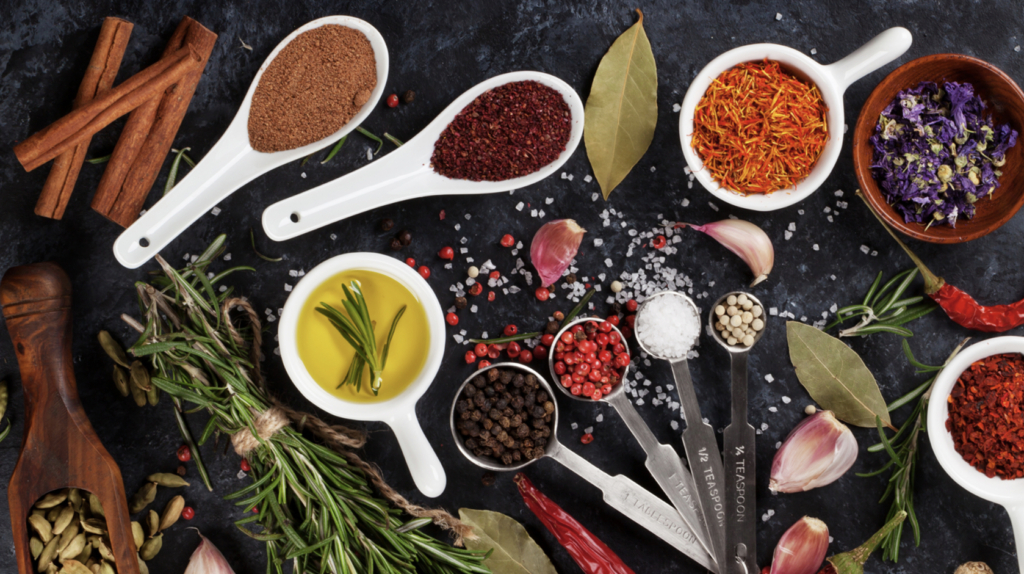History
In recent years, spices have gained popularity and the use of spices has increased by 50% over the past decade. The bulk of spices are imported into the United States and the spice trade has been important to our country since colonial times. (Some spices, like Nutmeg, were used at currency at one point.) Spices are used in a wide range of foods and cuisines, and we have some spices that are specific to our country like Cajun spice and pumpkin spice. Overall, spices have played an important role in American history and cuisine and continue to be valued for their vast flavor profiles and health benefits today.
Health Benefits of Spices
Spices can play an important role in promoting optimal brain health and cognitive function. Below are some of the ways spices can benefit the brain.
- Anti-inflammatory properties: Many spices, such as turmeric, ginger, and cinnamon, contain compounds that have anti-inflammatory properties. Chronic inflammation has been linked to a variety of cognitive disorders, including Alzheimer’s disease and depression. By reducing inflammation in the brain, spices may help to improve cognitive function and protect against cognitive decline.
- Antioxidant properties: Spices like rosemary, oregano, and sage contain compounds that have antioxidant properties. Antioxidants help to protect the brain from damage caused by free radicals, which can contribute to cognitive decline and neurological disorders.
- Improved blood flow: Some spices, like cayenne pepper and ginger, can help to improve blood flow to the brain. This increased blood flow can help to improve cognitive function and support overall brain health.
- Anti-inflammatory properties: Many spices, such as turmeric, ginger, and cinnamon, contain compounds that have anti-inflammatory properties. Chronic inflammation has been linked to a variety of cognitive disorders, including Alzheimer’s disease, type 2 diabetes, and depression. By reducing inflammation in the brain, spices may help to improve cognitive function and protect against cognitive decline.
Top Spices for Better Brain Health
Spices can add flavor and variety to our diet, which can help us maintain a healthy eating pattern and avoid monotony. This is important because a diet that is rich in nutrients, including brain-boosting spices, has been shown to be beneficial for overall health, including brain health. Incorporating brain-boosting spices into your meals is an easy and delicious way to support your brain health.
Let’s explore some top brain health spices, their benefits, and tips to try them!
- Turmeric: Curcumin, the active ingredient in turmeric, has anti-inflammatory and antioxidant properties that can help protect the brain from damage. Recommended dose: 500-1000mg of curcumin per day. Tips: Add turmeric to soups, stews, or roasted vegetables.
- Ginger: Ginger contains compounds that can improve blood flow to the brain and reduce inflammation. Recommended dose: 1-2 grams of fresh or dried ginger per day. Tips: Add fresh ginger to smoothies or grate it over stir-fried veggies.
- Cinnamon: Cinnamon has been shown to improve cognitive function and reduce inflammation in the brain. Recommended dose: 1-2 teaspoons of cinnamon per day. Tips: Add cinnamon to oatmeal, yogurt, or coffee.
- Sage: Sage contains compounds that can improve memory and cognitive function. Recommended dose: 300-600mg of sage extract per day. Tips: Add fresh or dried sage to roasted meats or vegetables.
- Rosemary: Rosemary has been shown to improve cognitive function and mood. Recommended dose: 750mg of rosemary extract per day. Tips: Add fresh rosemary to roasted potatoes or chicken.
- Black Pepper: Black pepper contains piperine, a compound that can improve cognitive function and reduce inflammation. Recommended dose: 20mg of piperine per day. Tips: Grind fresh black pepper over salads or roasted vegetables.
- Cloves: Cloves contain compounds that can improve memory and protect the brain from oxidative stress. Recommended dose: 1-3 grams of cloves per day. Tips: Add cloves to baked goods or spiced tea.
- Saffron: Saffron has been shown to improve cognitive function and reduce symptoms of depression and anxiety. Recommended dose: 30mg of saffron extract per day. Tips: Add saffron to rice dishes or soups.
- Nutmeg: Nutmeg contains compounds that can improve cognitive function and mood. Recommended dose: 1-2 teaspoons of ground nutmeg per day. Tips: Add nutmeg to baked goods or sprinkle over roasted vegetables.
- Cardamom: Cardamom contains compounds that can improve cognitive function and reduce inflammation. Recommended dose: 1-2 teaspoons of ground cardamom per day. Tips: Add cardamom to smoothies or chai tea.
The Spice of Life
Interested in incorporating spices into your diet? It’s important to remember that moderation is key. When grilling with spices experiment with different combinations to find your preferred flavor profile. For extra flavor, try adding spices to marinades, use spices as a meat rub, sprinkle spices on your favorite dishes, and more. You can also use fresh herbs like basil, parsley, and cilantro to add a burst of flavor to your grilled dishes. A friendly reminder to pair your grilled foods with plenty of fresh vegetables and whole grains to support your overall brain health.
Word of Caution
While spices are generally safe and beneficial, some may interact with certain medications or cause adverse reactions in some individuals. Additionally, the recommended doses provided are general guidelines and may need to be adjusted based on your individual health status. It is always a good idea to discuss your individual health needs and goals with your healthcare provider. They can help you determine if incorporating these brain-boosting spices into your diet is safe and appropriate for you and provide you with personalized recommendations based on your health history and current medications.
In brain health & wellness,
Krystal


